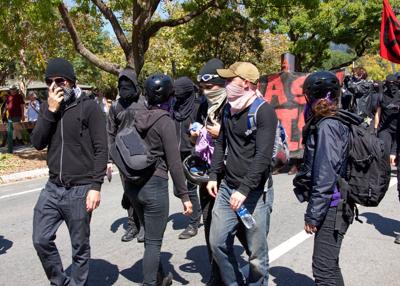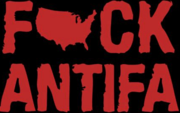CovOps

 Location : Ether-Sphere Location : Ether-Sphere
Job/hobbies : Irrationality Exterminator
Humor : Über Serious
 |  Subject: Human Degeneracy Watch: Little outcry over Antifa’s equal-opportunity beatdowns of journalists left and right Subject: Human Degeneracy Watch: Little outcry over Antifa’s equal-opportunity beatdowns of journalists left and right  Fri Oct 22, 2021 4:38 am Fri Oct 22, 2021 4:38 am | |
| Freelance photojournalist Maranie Staab believes her camera can be a force for truth and social justice. The work of a “conflict photographer” often requires physical courage in places she has reported from, such as Africa and the Middle East. It certainly did so on Aug. 22, while Staab was covering demonstrations in Portland, Oregon.

Staab, a 2020 reporting fellow for the liberal Pulitzer Center, was assaulted by the left-wing group antifa, and the assault was filmed and distributed online, resulting in widespread condemnation. Yet despite the alarming increase in such attacks, reporters who cover antifa express frustration that the condemnation of the attack on Staab was an aberration. More often than not, antifa’s attacks on the press have gone ignored.
No reporter is better known for covering antifa than Andy Ngo, author of the best-selling book “Unmasked: Inside Antifa’s Radical Plan to Destroy Democracy.” Ngo, the son of Vietnamese immigrants, started reporting on protest violence for the Portland State Vanguard, Portland State University‘s student newspaper, in 2016.
With left-wing violence largely ignored by legacy news organizations, Ngo found there was a market for coverage of Portland’s growing problem with street violence – notably by antifa, a largely decentralized, avowedly anti-fascist and anti-racist political movement without an identifiable leader or spokesperson that is concentrated in the Pacific Northwest.
Soon Ngo was in the streets working as a freelance reporter while his Twitter feed became a nationally known clearinghouse for information related to antifa – everything from videos of violence and vandalism to the ensuing mugshots and charging documents.
In June 2019, Ngo was jumped by a crowd of antifa protesters while reporting on a demonstration in the city. They kicked him in the groin, repeatedly punched him in the head while wearing tactical gloves with fiberglass-reinforced knuckles, and pelted him with hard objects. Ngo ended up in the hospital with a brain hemorrhage.
Ngo says he has been attacked four times and no longer lives in Portland out of concern for his safety, but antifa regularly make menacing appearances at his aging mother’s house in the city. Graffiti has appeared in Portland saying, “Kill Andy Ngo.” and “Andy Ngo 187” – 187 being a police code denoting murder. “It’s just been this constant incitement to kill me,” he says. “That’s why I left at the end of last year,” Ngo said.
Ngo and other journalists complain that media organizations have not done enough to defend them. Following the attack on Staab, the Oregon chapter of the Society of Professional Journalists issued a statement noting that “assaulting journalists runs counter to the ideals of our democracy.” But RCI could find only one other statement from the society’s Oregon chapter condemning an attack by left-wing protesters. The organization did not respond to RCI’s request for other examples of its condemnation of attacks on other reporters.
Ngo isn’t alone in thinking that these attacks on the press are being downplayed. So does Nancy Rommelmann, who as a journalist has written for the New York Times and the Wall Street Journal. Working as a freelancer, she filed several reports on antifa and street violence in Portland for the libertarian magazine Reason.
She was attacked in the streets, she says, and threatened online, with her photo publicly posted. Rommelmann believes the traditional media are ignoring the street violence for political reasons – they don’t want antifa’s extremism to be seen as discrediting to liberal causes. “I can tell you that 100% of the people that have attacked and continue to attack me, they’re all on the left – all of them. And I consider myself a liberal,” Rommelmann said.
Even as outlets including the Guardian and the Washington Post published articles dismissing left-wing violence – including a Post fact-check piece last summer declaring, “Who caused the violence at protests? It wasn’t antifa” – others attacked the reporters trying to cover the protests.
Critics say that Ngo should not be treated as a legitimate journalist and allege that he has reported misleading or non-objective information. An article in the Columbia Journalism Review referred to him as a “discredited provocateur.” Ngo does much of his reporting on Twitter and social media, in part due to a lack of interest in antifa from the broader media.
Ngo’s reporting makes clear that he’s critical of antifa. Moreover, if making the occasional error or having a point of view is disqualifying for a journalist, the New York Times and Washington Post – and most reporters and editors in the country – would have their press credentials revoked. The criticism of Ngo is particularly galling when one considers that his main point of view is that “political violence is wrong.”
He remains undeterred. In June, when a reporter from the left-leaning sports site Deadspin was among those demanding Twitter stop calling Ngo a journalist, he responded. “My detractors do this because they want to take away the one thing that all decent people agree on: press freedom is sacred,” Ngo wrote. “Who the far-left defines as ‘press’ are those who write what they approve of. Anyone else is a ‘provocateur’ deserving of intimidation and violence.”
.https://www.thecentersquare.com/national/op-ed-little-outcry-over-antifa-s-equal-opportunity-beatdowns-of-journalists-left-and-right/article_2aa5c544-329c-11ec-9b28-e7e7b9b2e9cf.html
  |
|

